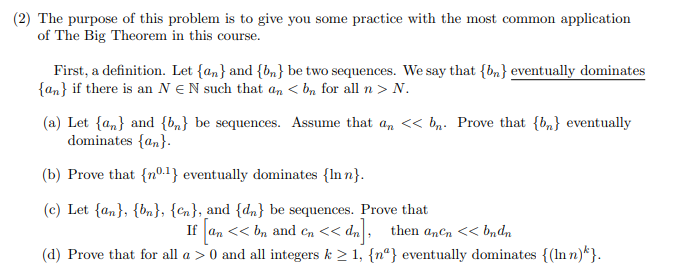2) The purpose of this problem is to give you some practice with the most common application of The Big Theorem in this course. First, a definition. Let {an} and {bn} be two sequences. We say that {bn} eventually dominates {an} if there is an N € N such that a,n < bn for all n> N. (a) Let {an} and {bn} be sequences. Assume that a, << bn. Prove that {b„} eventually dominates {a„}. (b) Prove that {n0.1} eventually dominates {In n}. (c) Let {an}, {bn}, {Cn}, and {dn} be sequences. Prove that If an << bn and en << dn, then a„Cn << bndn (d) Prove that for all a >0 and all integers k > 1, {nª} eventually dominates {(In n)*}.
2) The purpose of this problem is to give you some practice with the most common application of The Big Theorem in this course. First, a definition. Let {an} and {bn} be two sequences. We say that {bn} eventually dominates {an} if there is an N € N such that a,n < bn for all n> N. (a) Let {an} and {bn} be sequences. Assume that a, << bn. Prove that {b„} eventually dominates {a„}. (b) Prove that {n0.1} eventually dominates {In n}. (c) Let {an}, {bn}, {Cn}, and {dn} be sequences. Prove that If an << bn and en << dn, then a„Cn << bndn (d) Prove that for all a >0 and all integers k > 1, {nª} eventually dominates {(In n)*}.
Algebra & Trigonometry with Analytic Geometry
13th Edition
ISBN:9781133382119
Author:Swokowski
Publisher:Swokowski
Chapter10: Sequences, Series, And Probability
Section10.2: Arithmetic Sequences
Problem 68E
Related questions
Question

Transcribed Image Text:(2) The purpose of this problem is to give you some practice with the most common application
of The Big Theorem in this course.
First, a definition. Let {an} and {bn} be two sequences. We say that {bn} eventually dominates
{an} if there is an N €N such that an < bn for all n > N.
(a) Let {an} and {b„} be sequences. Assume that a,n << bn. Prove that {b,} eventually
dominates {an}.
(b) Prove that {nº.1} eventually dominates {In n}.
(c) Let {an}, {bn}, {Cn}, and {dn} be sequences. Prove that
If an << bn and en << dn
(d) Prove that for all a > 0 and all integers k > 1, {n°} eventually dominates {(In n)*}.
anCn
<< bndn
Expert Solution
This question has been solved!
Explore an expertly crafted, step-by-step solution for a thorough understanding of key concepts.
Step by step
Solved in 2 steps with 2 images

Recommended textbooks for you

Algebra & Trigonometry with Analytic Geometry
Algebra
ISBN:
9781133382119
Author:
Swokowski
Publisher:
Cengage

Linear Algebra: A Modern Introduction
Algebra
ISBN:
9781285463247
Author:
David Poole
Publisher:
Cengage Learning

Algebra & Trigonometry with Analytic Geometry
Algebra
ISBN:
9781133382119
Author:
Swokowski
Publisher:
Cengage

Linear Algebra: A Modern Introduction
Algebra
ISBN:
9781285463247
Author:
David Poole
Publisher:
Cengage Learning